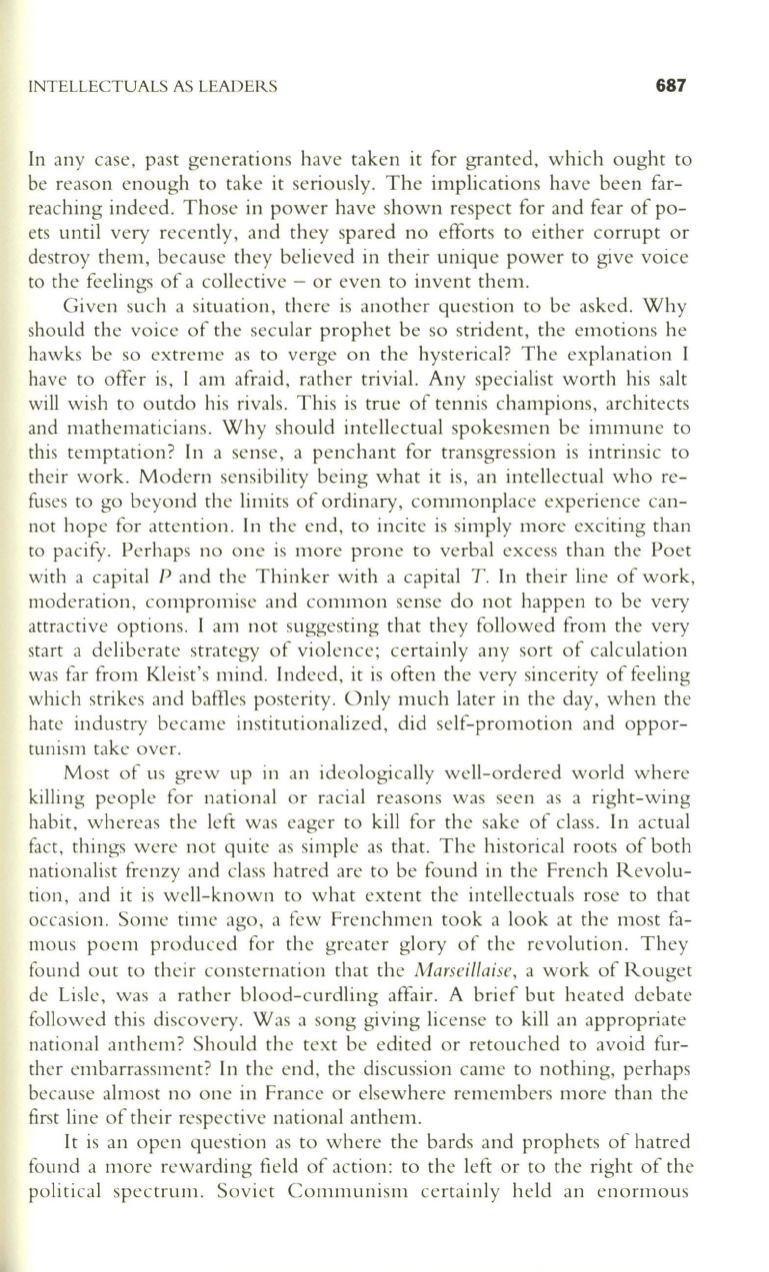
INTELLECTUALS AS LEADERS
687
In any case, past generations have taken it for granted, which ought to
be reason enough to take it seriously. The implications have been far–
reaching indeed. Those in power have shown respect for and fear of po–
ets until very recently, and they spared no efforts to either corrupt or
destroy them, because they believed in their unique power to give voice
to the feelings of a collective - or even to invent them.
Given such a situation, there is another question to be asked. Why
should the voice of the secular prophet be so strident, the emotions he
hawks be so extreme as to verge on the hysterical? The explanation I
have to offer is, I am afraid, rather trivial. Any specialist worth his salt
will wish to outdo his rivals. This is true of tennis champions, architects
and mathematicians. Why should intellectual spokesmen be immune to
this temptation? In a sense, a penchant for transgression is intrinsic to
their work. Modern sensibility being what it is, an intellectual who re–
fuses to go beyond the limits of ordinary, commonplace experience can–
not hope for attention. In the end, to incite is simply more exciting than
to pacify. Perhaps no one is more prone to verbal excess than the Poet
with a capital
P
and the Thinker with a capital
T.
In their line of work,
moderation, compromise and common sense do not happen to be very
attractive options. I am not suggesting that they followed from the very
start a deliberate strategy of violence; certainly any sort of calculation
was far from Kleist's mind. Indeed, it is often the very sincerity of feeling
which strikes and baffies posterity. Only much later in the day, when the
hate industry became institutionalized, did self-promotion and oppor–
tunism take over.
Most of us grew up in an ideologically well-ordered world where
killing people for national or racial reasons was seen as a right-wing
habit, whereas the left was eager to kill for the sake of class. In actual
fact, things were not quite as simple as that. The historical roots of both
nationalist frenzy and class hatred are to be found in the French Revolu–
tion, and it is well-known to what extent the intellectuals rose
to
that
occasion. Some time ago, a few Frenchmen took a look at the most fa–
mous poem produced for the greater glory of the revolution. They
found out to their consternation that the
Marseillaise,
a work of Rouget
de Lisle, was a rather blood-curdling affair. A brief but heated debate
followed this discovery. Was a song giving license to kill an appropriate
national anthem? Should the text be edited or retouched to avoid fur–
ther embarrassment? In the end, the discussion came to nothing, perhaps
because almost no one in France or elsewhere remembers more than the
first line of their respective national anthem.
It is an open question as to where the bards and prophets of hatred
found a more rewarding field of action: to the left or to the right of the
political spectrum. Soviet Communism certainly held an enormous


